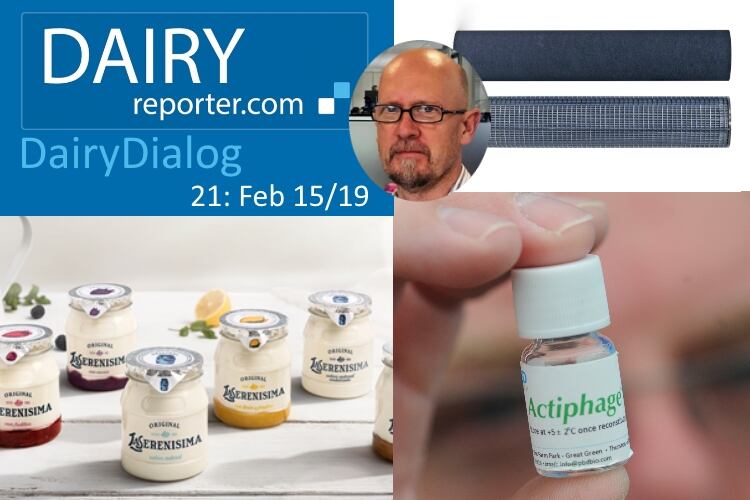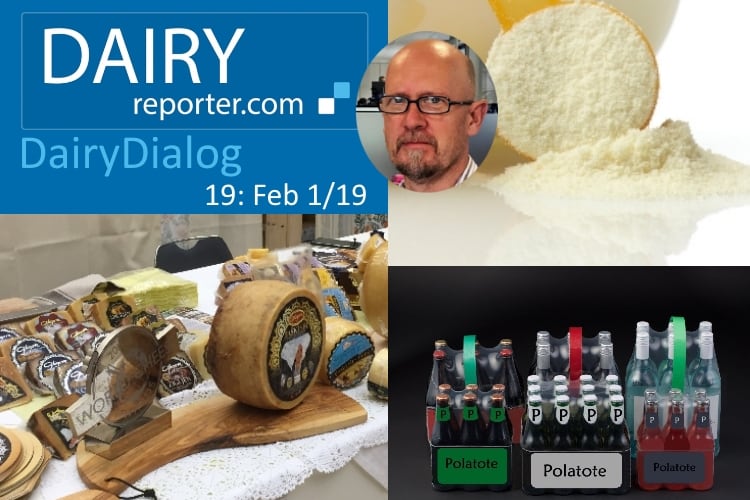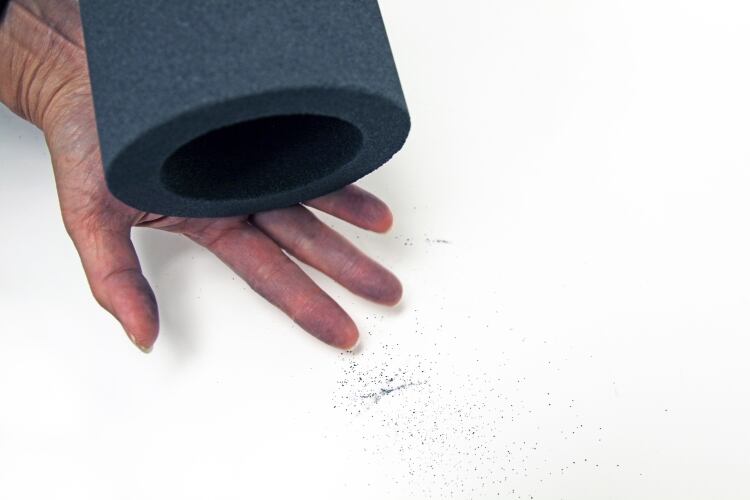We spoke with the CEO of UK company PBD Biotech, Dr Berwyn Clarke, about the Actiphage testing technology that recently won a dairy innovation award; Rodrigo Lecot, vice president, commercial div., Amcor Rigid Plastic-Latin America, about partnering with Danone on new yogurt packaging in Argentina, and with Richard Juskowiak, product support specialist with Donaldson Company in the US, about new stainless steel filters to prevent carbon shedding.
And we take a look at the weekly global dairy market with INTL FCStone.
PBD Biotech’s Actiphage technology wins Royal Dairy Innovation Award 2019
PBD Biotech’s novel Actiphage testing technology was crowned winner of the Royal Dairy Innovation Award at Dairy-Tech 2019 (6 February 2019).
The Royal Dairy Innovation trophy and certificate are awarded for research and development in the field of dairy farming. With the award going to the most practical, relevant product, which is likely to be the most significant innovation for the future of dairying.
Actiphage is an innovative new test for the rapid detection of bovine TB, Johne’s disease and other mycobacterial infections. It has the potential to expedite food safety checks on milk and dairy products; revolutionize livestock disease management; and ease the burden on farmers, the industry and wider public.
Receiving the award from HRH The Princess Royal, CEO of PBD Biotech Dr Berwyn Clarke said, "The dairy industry is known as an early-adopter of innovation, so we’re delighted Actiphage has been recognized among such a strong field of emerging tech and forward-thinking services."
Every year, Johne’s disease costs UK farmers and industry at least £13m and an increasing number of retailers are removing suppliers from their milk pool if they are not engaged in Johne’s disease testing.
In the UK, bovine TB results in almost 44,000 cattle slaughtered annually and an estimated cost to the taxpayer of £100m.
PBD Biotech’s Actiphage fits into current animal health testing practices and is the only diagnostic able to detect live mycobacteria - differentiating between infection and vaccination – that delivers results within six hours.
Originally developed as a tool for diagnosis of human TB, Actiphage has been optimized and developed to provide enhanced sensitivity and specificity for use in blood or milk samples.
“Globally there is growing concern regarding the presence of live mycobacteria in milk that may have human health implications. This prestigious award is recognition of the opportunity this technology provides to ensure dairy products are free from these organisms as part of routine dairy quality control,” Clarke added.
“We are seeing significant interest from dairy organizations throughout the world in Actiphage, and this award will significantly aid in transferring our technology into those global markets.”
Amcor develops PET jar for cold-fill dairy products
Amcor has partnered with Danone to develop a PET (polyethylene terephthalate) jar for cold-fill dairy products.
The transparent 200ml PET jar consists of a wide-mouth opening and aluminum-PET-aluminum closure with a 65mm over cap in clear polypropylene (PP) was developed for Danone’s La Serenísima’s yogurt, sold in Argentina.
Market demand
Martin Darmandrail, new business development director, Amcor Argentina, said the yogurt market in Latin America continues to grow as companies develop products to appeal to health-conscious consumers.
The company optimized the two-step reheat process to produce the wide-mouth jars using a Matrix blow-molding machine for high-volume yogurt containers.
The La Serenísima jar features engraving, a finely finished base, and a body-wrap label. To protect the contents, it has a 55mm finish with aluminum-PET-aluminum-foil barrier seal and an ultraviolet blocker.
In Argentina, Danone has launched La Serenísima Original-brand yogurt in six flavors (natural, natural sweetened, strawberry, blackberry, lemon and ginger, and sweet squash) and will extend commercialization of the product to the rest of Latin America.
Stork filling line
Danone has installed a Stork filling line and plans production rates of 40 to 50 million units per year.
Maximiliano Sassone, R&I director, Danone Argentina, said the design of La Serenísima Original, is inspired by the first yogurt made by La Serenísima 55 years ago, which revolutionized the category in 1963.
“We select the ingredients, including milk from Argentine family farms, and pay respect to every step of the original process, creating a 100% natural product without preservatives, so our consumers can connect to their memories of the original product,” he said.
Donaldson introduces stainless steel alternative to meet Pasteurized Milk Ordinance
Donaldson Company, Inc., a supplier of filters for food and beverage processors, has addressed a contamination risk posed by carbon tube steam filters with the introduction of a new stainless steel alternative.
Donaldson’s new GSL-N stainless steel filter complies with the Pasteurized Milk Ordinance (PMO), while eliminating potential carbon shedding in high-temperature, high-pressure applications.
Originally drafted in the 1950s, the PMO specifies that dairy processors use carbon tube steam filters “or equivalent.” The stainless steel GSL-N element has been independently verified to provide equivalent filtration. It also fits into most existing carbon tube housings common in dairy processing plants.
Donaldson developed the alternative filter at the request of dairy processors who discovered undesirable carbon particles in their process following a high-force event such as water hammer.
Richard Juskowiak, product support specialist with Donaldson Company in the process filtration group, said, “Since GSL-N filters fit legacy carbon tube housing, facilities can upgrade to durable stainless steel without expensive remodeling.
“Dairy processors can comply with the PMO without worry that their carbon filters will shed downstream into their process or product.”
Product advantages
GSL-N elements are constructed with 316L stainless steel for operation in high-temperature and high-pressure environments, and with efficiency of 99.9% at 2 microns, they exceed 3-A Standards for culinary-grade steam, which requires the removal of 95% of contaminants 2 microns and larger.
The elements can be ultrasonically cleaned up to six times before replacement, saving costs over non-reusable carbon filters, and, their pleated media provides greater filtration surface area than carbon, reducing pressure drop by a factor of eight, which conserves energy.




